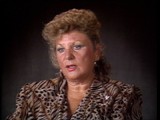You searched for: bergen-belsen
<< Previous | Displaying results 41-50 of 193 for "bergen-belsen" | Next >>
-
German mayors view mass graves at Bergen-Belsen
PhotoAfter liberation of the Bergen-Belsen camp, British soldiers forced German mayors from nearby towns to view mass graves. Bergen-Belsen, Germany, after April 15, 1945.
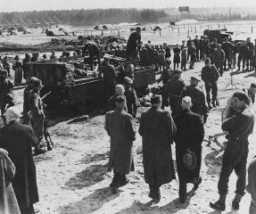
-
Doriane Kurz describes appell (roll call) in Bergen-Belsen
Oral HistoryDoriane's Jewish family fled to Amsterdam in 1940, the same year Germany occupied the Netherlands. Her father died after deportation to Auschwitz. After their mother was seized, Doriane and her brother hid with gentiles. The three were reunited at Bergen-Belsen, where they were deported via Westerbork. They were liberated during the camp's 1945 evacuation, when Doriane was 9. Her mother died of cancer soon after Doriane helped her recover from typhus. Doriane and her brother immigrated to the United States.
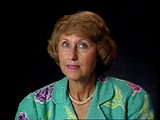
-
Doriane Kurz recalls Bergen-Belsen prisoners hauling wagons of corpses
Oral HistoryDoriane's Jewish family fled to Amsterdam in 1940, a year that also saw the German occupation of the Netherlands. Her father perished after deportation to Auschwitz. After their mother was seized, Doriane and her brother hid with gentiles. The three were reunited at Bergen-Belsen, where they were deported via Westerbork. They were liberated during the camp's 1945 evacuation. Doriane's mother died of cancer soon after Doriane helped her recover from typhus.
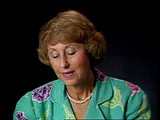
-
Ruth Moser Borsos describes roll call (Appell) in Bergen-Belsen
Oral HistoryRuth moved to the Netherlands after Kristallnacht (the "Night of Broken Glass") in 1938. She and her father had permits to sail to the United States, but Germany invaded the Netherlands in May 1940 and they could not leave. Ruth was deported to the Westerbork camp in 1943 and to the Bergen-Belsen camp in Germany in 1944. After an exchange agreement with the Allies broke down, Ruth was interned near the Swiss border until liberation by French forces in 1945.
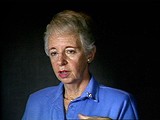
-
Doriane Kurz describes food rations and conditions in Bergen-Belsen
Oral HistoryDoriane's Jewish family fled to Amsterdam in 1940, a year that also saw the German occupation of the Netherlands. Her father perished after deportation to Auschwitz. After their mother was seized, Doriane and her brother hid with gentiles. The three were reunited at Bergen-Belsen, where they were deported via Westerbork. They were liberated during the camp's 1945 evacuation. Doriane's mother died of cancer soon after Doriane helped her recover from typhus. Doriane and her brother immigrated to the United…
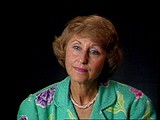
-
Emanuel (Manny) Mandel describes the "Kasztner train" journey to Bergen-Belsen
Oral HistoryEmanuel's father was a cantor who became, soon after Emanuel was born, one of the chief cantors in Budapest. Germany occupied Hungary in March 1944. Systematic deportations of Jews from Hungary to the Auschwitz camp in occupied Poland began in May 1944. Emanuel and his mother were part of the train, organized by Zionist activist Rezso Kasztner, of over 1,600 Hungarian Jews who were to be sent to neutral countries as part of an exchange program. The train arrived at the Bergen-Belsen camp, where the…
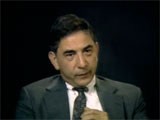
-
British army chaplain describes Bergen-Belsen upon liberation
FilmBritish troops liberated the Bergen-Belsen concentration camp in Germany in April 1945. They filmed statements from members of their own forces. In this British military footage, British army chaplain T.J. Stretch recounts his impressions of the camp.
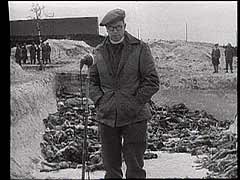
-
Bella Jakubowicz Tovey describes a British soldier's visit while she was hospitalized in Bergen-Belsen after liberation
Oral HistoryBella was the oldest of four children born to a Jewish family in Sosnowiec. Her father owned a knitting factory. After the Germans invaded Poland in 1939, they took over the factory. The family's furniture was given to a German woman. Bella was forced to work in a factory in the Sosnowiec ghetto in 1941. At the end of 1942 the family was deported to the Bedzin ghetto. Bella was deported to the Graeben subcamp of Gross-Rosen in 1943 and to Bergen-Belsen in 1944. She was liberated in April 1945.
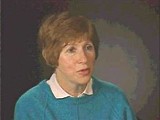
-
Lilly Appelbaum Malnik describes death march from Auschwitz to Bergen-Belsen
Oral HistoryGermany invaded Belgium in May 1940. After the Germans seized her mother, sister, and brother, Lilly went into hiding. With the help of friends and family, Lilly hid her Jewish identity for two years. But, in 1944, Lilly was denounced by some Belgians and deported to Auschwitz-Birkenau via the Mechelen camp. After a death march from Auschwitz, Lilly was liberated at Bergen-Belsen by British forces.
